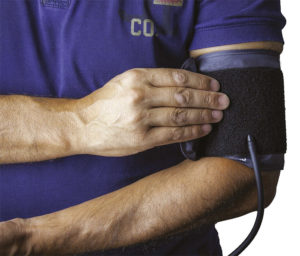By CHRIS FIELDS

High blood pressure? Repent!
I was speaking with a close dietician friend recently about how the Lord requires us to take care of our bodies. She shared with me a time when she was asked to work a prayer line at her church. There was a lady in line who wanted healing, and it just so happened the lady came to her for prayer. “I want the Lord to heal me of my high blood pressure,” the lady said.
My friend’s response was, “Have you changed your diet and started an exercise regimen?” The lady responded, “No, I want the Lord to heal me.” My friend and I had a good laugh about this situation, but I quickly came to realize that this mindset of Christians is no laughing matter at all.
My friend’s medically trained response would have been the same regardless of whether she was in a health center giving counsel, or praying with Christians in a prayer line at church. Not because she didn’t believe God was our healer, but because she knew how to naturally tap into God’s healing.
What’s not funny is how Christians won’t take ownership of their sins when it comes to diseases like Type 2 diabetes and most cases of high blood pressure, and won’t repent as the Lord requires. To repent means to express remorse for an action and to turn away from that action. Healing occurs when we begin to practice obedience in areas of disobedience.
Once we hear truth, we are required to obey that truth. The problem with us as Christians is that we have trouble deciphering truth when it comes to our health and wellness. We don’t want to take responsibility as the Lord requires, and because we don’t, we never experience the freedom truth can bring. Jesus says, “You shall know the truth, and the truth shall set you free.” Although in this verse He is referencing Himself as truth, we also must acknowledge the truth in how He created us.
Here are some truths about how we are created as it relates to high blood pressure. High blood pressure is a multifactorial disorder that causes vascular remodeling — changes to the shape of blood vessels — which in turn causes abnormal pressure to the vessels’ walls. If left uncontrolled, we can develop heart diseases, experience heart attacks or strokes, or even die (worst case).
The most common factors that contribute to high blood pressure are genetics, aging, psychosocial stress, obesity, diabetes, insulin resistance, alcohol abuse, sedentary lifestyle, high salt consumption, and low potassium consumption. We can’t determine our genetic makeup, nor can we stop the aging process, but the other factors of high blood pressure we can control. Once diagnosed with high blood pressure, living a repentant lifestyle will help you control your diagnosis, and it can even reverse that diagnosis, a godly truth that my dietician friend knew.
Here are some ways to do that:
Lose extra pounds and watch your waistline. Blood pressure often increases as weight increases, particularly waistline weight, so weight loss is one of the most effective ways for controlling blood pressure. A goal waistline for women is lower than 35 inches, and for men lower than 40 inches.
Exercise regularly. Regular physical activity of 150 minutes a week, or 30 minutes a day, can lower your blood pressure by about 5 to 8 mmHg if you have high blood pressure. It’s important to be consistent because if you stop exercising, your blood pressure can rise again. A combination of resistance training and cardio is best.
Eat a healthy diet. Eating a diet that is rich in whole grains, fruits, vegetables and low-fat dairy products, and skimps on saturated fat and cholesterol, can lower your blood pressure by up to 11 mmHg if you have high blood pressure. This eating plan is known as the Dietary Approaches to Stop Hypertension (DASH) diet.
Reduce stress. Stress creates hormonal imbalances in our body — which can cause elevated heart rates, increasing blood flow, which is dangerous when our body is at rest. Stress is also detrimental because a lot of us turn to unhealthy foods for comfort. Beyond just reducing stress in order to lower your blood pressure, the Bible tells us to give God our cares anyway, because He cares for us (1 Peter 5:7).
My prayer is that we all come to a full understanding of our Creator, and that we begin to honor Him in how He created us, making us healthy and whole.

Chris Fields is the founder and executive director of H.E.A.L. Mississippi and a graduate in kinesiology with advanced studies in nutrition. He serves as a clinical exercise physiologist/CPT and is credentialed in Exercise Is Medicine through American College of Sports Medicine.

